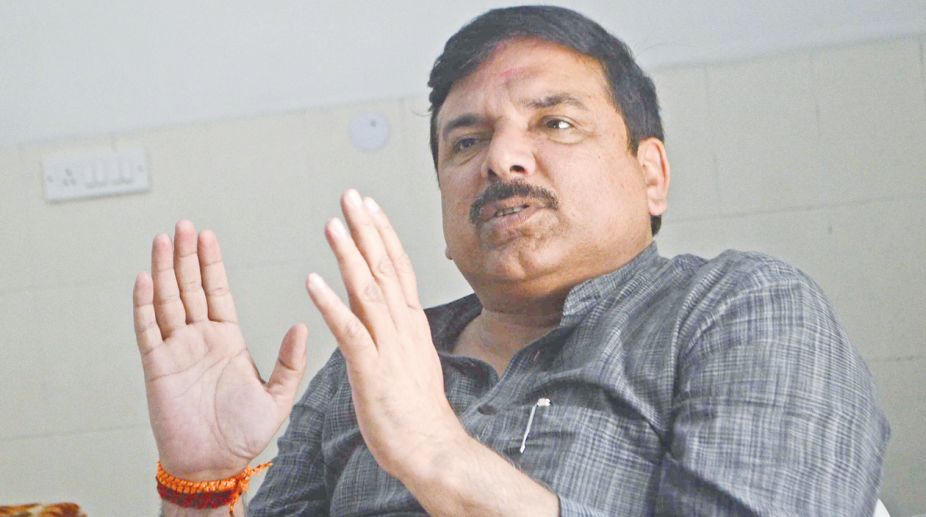Sanjay Singh has been a leader of the Aam Aadmi Party since its inception in November 2012. Singh is a member of the party’s highest decision-making body, the Political Affairs Committee (PAC) and is also a national spokesperson.
He has been associated with Delhi Chief Minister Arvind Kejriwal’s apolitical campaigns from the Right to Information campaign in 2006 to the 2011 Indian anti-corruption movement led by social activist Anna Hazare.
Advertisement
He was elected to the Rajya Sabha in January from Delhi. Singh spoke with JUNAID KATHJU about his political journey and more. Excerpts:
Q: How did you come into politics?
A: After I completed my diploma in Mining Engineering from Orissa School of Mining Engineering in Keonjhar, I returned to my home town Sultanpur in Uttar Pradesh and started an organisation “Azad Samaj Sewa Samiti” in 1994.
Initially, we used to arrange blood donation camps, health camps… it was complete social work. In the meantime, an encroachment drive started in our town and many vendors and shopkeepers, who belong to poor families, lost their business.
So I started fighting for the rights of these people. It was during this time (1997-98) when I met socialist leader Raghu Thakur. A staunch follower of Gandhi and Lohia’s ideology, he was general secretary of Janata Dal when VP Singh was the Prime Minister of India. He had done a lot of social work.
He was a great leader. So I joined him in his minor socialist party called Loktantrik Samajwadi party. It was from there that my political journey started.
Then in 2005-06, I met Arvind Kejriwal when he launched Right to Information campaign. In 2011, the anti-corruption movement led by social activist Anna Hazare started in which we all participated. In 2012, the AAP came into existence and here I am today.
Q: Today, you are a Rajya Sabha member. Do you feel more responsibility on your shoulders now?
A: If you listen to my speeches in Parliament, I have taken up issues which are not only confined to Delhi but what the entire country is facing. I talked about hate politics in the country.
I raised issues related to women, farmers, youth. In the current session, I am highlighting the issues of traders who are facing sealing of their business establishments in Delhi.
So, as a parliamentarian, I am fulfilling all my duties. I think Parliament is a platform where the entire country listens to you.
Q: After registering a massive win in the 2015 Delhi assembly elections, the last three years have been testing times for the AAP. You lost all state elections. The party was steeped in internal conflicts. What went wrong?
A: Let me tell you what actually happened. In 2013, when we formed the government for the first time, we immediately took many initiatives related to electricity, water and to curb corruption. But our government lasted for only 49 days.
Then in 2015, we returned with a thumping victory, stopping the BJP’s winning streak. That jolted them. So, they (BJP) started working against us. Many hurdles were created in our developmental work and it continues.
Fourteen of our bills are pending with the Centre. Services were taken from us. Anti-corruption branch (ACB) was taken from us. So we were literally left with no power.
Now, let us analyse what is left with us. We have control over health, education, PWD and agriculture sector. And in all these sectors, our government has done exceptional work.
The world is praising our mohalla clinics. Today, we have the best government schools in the country. The problem is we are being asked to answer about things which are not in our control.
Q: This is Delhi you are talking about. What about other states? Don’t you feel that the party is losing ground? Even Arvind Kejriwal admitted it in one of his speeches lately.
A: See, you need to understand that AAP is just a five-year-old party. In Punjab, yes, we were hoping to win but still we didn’t perform badly. We beat the 100-year-old Akali Dal and emerged as a main Opposition party. In Goa, we got 6.2 per cent vote. The thing is that even our good performances are being portrayed as losses.
Q: Your party is also accused of being run by a single person Arvind Kejriwal. It is being alleged that there is no room for dissent in the party. Is it true?
A: It is not true. It is a well-planned campaign against Arvindji. He was also once called anti-national. And it was done by the same people who today have alliances with parties like PDP in Kashmir who call Afzal Guru a martyr and IPFT in Tripura who want separate land. In fact, we should look into Modiji’s party, where people like Shatrughan Sinha and Yashwant Sinha are openly rebelling against his diktat.
Q: The AAP has often criticised the BJP for playing communal politics in the country. But the fact is that they are winning state after state. Doesn’t it show their popularity in the country?
A: Hitler was also popular in Germany. People in large numbers used to come out in his support.
Q: So you are comparing Prime Minister Modi to Hitler?
A: Yes. Look at the way he is dividing the country. Today, statues of Lenin, Gandhi, Ambedkar are getting vandalised. We have 130 crore people living in our country belonging to different colours, religions and castes.
Now, in a country like ours, you are dictating to us who will eat what. What is this? You want Taj Mahal to be destroyed because it was made by Mughals. So then you should also demolish Red Fort, Qutub Minar.
You should also demolish Rashtrapati Bhavan and Parliament. They too are symbols of slavery in the country.
The BJP is the party which didn’t unfurl the national flag for 52 years at their RSS headquarters. So, the BJP is not a national party, it is a pseudo-national party.
Q: Do you believe that the AAP has the potential to end the Modi wave in the 2019 parliamentary elections?
A: Only people of this country have the potential to stop the Modi wave. We as a party can only make people aware how dangerous the BJP is for the future of this country. How on the lines of caste and religion they are dividing this country.











